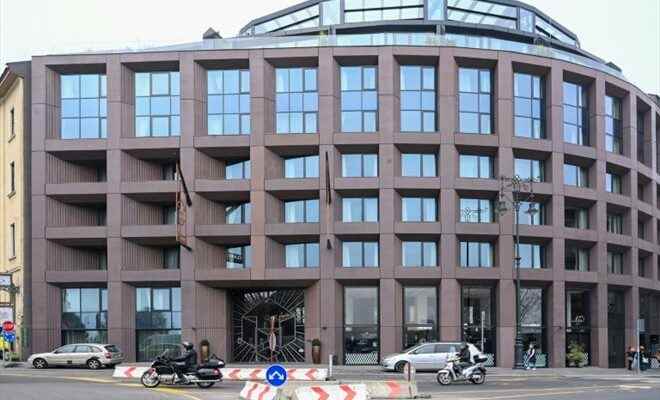Attila Juhasz, anti-corruption activist from the NGO K-Monitor, outside the Alice Hotel, on October 6, 2022 in Budapest, Hungary (AFP/ATTILA KISBENEDEK)
It is the latest fashionable hotel in the Hungarian capital, but for Attila Juhasz, an anti-corruption activist, it symbolizes above all the monopolization of the tourist sector by an elite who have enriched themselves under the mandate of Viktor Orban.
To raise consumer awareness, his NGO K-Monitor lists controversial addresses, such as this superb neo-renaissance building called Alice Hotel.
“We are on the prestigious Andrassy Avenue lined with 19th century palaces” and under which runs the oldest metro in Europe, built in 1893, explains Mr. Juhasz.
“One of the owners is a business partner of Istvan Tiborcz, the son-in-law of the nationalist Prime Minister”, details this 30-year-old with a thick beard, yellow parka on his back.
The NGO has set up an interactive map, nerhotel.hu, a sort of guide that can be consulted online. Enough to allow people to check that they are not “spending their money” to enrich politically involved personalities, summarizes Attila Juhasz.
In three years, more than 400 references, very often located in the historic heart of Budapest, classified by Unesco, have joined the database.

Attila Juhasz, anti-corruption activist from the NGO K-Monitor, outside the Alice Hotel, on October 6, 2022 in Budapest, Hungary (AFP/ATTILA KISBENEDEK)
Between 3,000 and 3,500 unique visitors visit the site each month and “people are constantly asking us to check new addresses”, rejoices the activist. An English version is in preparation.
Contacted by AFP, the Alice Hotel and two other popular addresses, Café Opéra and Hotel Moments, did not respond.
– “accumulation of money” –
Since the return to power of Viktor Orban, twelve years ago, in this country of nearly 10 million inhabitants, a member of the European Union (EU), Brussels and NGOs have denounced the capture of the economy by a circle close to the government.

The Felix Kitchen&Bar building on November 8, 2022 in Budapest, Hungary (AFP/ATTILA KISBENEDEK)
Worried about a possible embezzlement of European funds, the EU has so far refused to pay the 7.5 billion euros that Hungary is entitled to in the coming years.
A deadline has been granted to Budapest until December 19, in order to verify the implementation of the promised anti-corruption laws.
The post-Covid recovery plan is also blocked. A meeting on the subject is to be held in Brussels on November 22, according to a European source.
According to a Strasbourg Parliament report published in September, the European Anti-Fraud Office (Olaf) recommended that the Commission recover 2.2% of EU funds paid to Hungary between 2016 and 2020.
This is the highest percentage among the Member States and a figure well above the average of 0.29%.
“As of nowhere, a few individuals have become the richest men in the country since 2010,” denounces Marta Pardavi, of the Helsinki Committee for the Defense of Human Rights.
“Their lifestyle is far from ordinary Hungarians, who are still poor in some areas, and they would have a hard time justifying this surprisingly rapid accumulation of money,” she continues.
With the crisis deepening against a backdrop of war in Ukraine, “the very visible enrichment” of the oligarchs contrasts according to her with “a public health system in ruins” and “schools in dire straits”.
– “Hungarian entrepreneur class” –
Because there is a link between the embezzlement of public money and the increase in misery, according to Peter Akos Bod, an economist at Corvinus University.

The Clark Budapest Hotel, on November 8, 2022 in Budapest, Hungary (AFP/ATTILA KISBENEDEK)
“If the winner of a government tender overcharges his project and pockets the difference, it drives up the bill,” explains this former governor of the central bank. “It’s the royal road to inflation” (21% in October over one year), further aggravated by the absence of real competition”.
To justify himself, Viktor Orban often says that he wanted to finally establish a “class of Hungarian entrepreneurs” and recover capital held until his arrival by large international groups that benefited from the privatization of assets after the communist era. .
But by “converging funds towards circles of friends”, he has created an “overly centralized crony capitalism” which is no longer a “classic Western market economy”, notes the expert.
Certainly, whole sections, such as the powerful automobile industry, dominated by German and Japanese manufacturers, escape its power.
Still, the takeover grows stronger, aiming to survive the Orban era. After the banking sector, Budapest recently got its hands on telecoms, by taking over the Hungarian subsidiary of the British group Vodafone.
In an apparent gesture of goodwill in response to EU concerns, the government in September canceled a 138 million forint (342,000 euros) public contract, financed by EU funds and won by two communication agencies to promote heritage.
They were the only candidates in the running.
© 2022 AFP
Did you like this article ? Share it with your friends with the buttons below.




